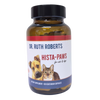Pet allergies are a growing concern, affecting countless furry companions every year. From itchy skin to gastrointestinal distress, the symptoms can be frustrating for both pets and their owners. In a recent discussion, Dr. Ruth Roberts, a holistic pet health coach, and Dr. Jeff Grognet, a veterinarian with decades of experience, shared their expertise on managing pet allergies naturally while balancing conventional and holistic approaches. Here’s a comprehensive look at their insights:
Understanding Pet Allergies
Common Symptoms
- Skin Issues: Itching, redness, hot spots, and chewing on paws.
- Gastrointestinal Problems: Soft stool, diarrhea, or loud gut noises.
- Chronic Conditions: Frequent ear infections or anal gland problems.
Early warning signs like these often indicate underlying food sensitivities or environmental triggers.
Environmental Allergies
Pollen, mold, and grass seeds are common culprits. Interestingly, pollen levels measured for humans (at five feet off the ground) don’t reflect what pets experience closer to the ground. Activities like running through fields or grasses can exacerbate symptoms.
Conventional Treatments: The Good and the Bad
Steroids and Modern Drugs
Medications like prednisone, Apoquel, and Cytopoint are widely used to provide immediate relief. While they can be life-saving in acute cases, long-term use poses risks such as:
- Increased susceptibility to infections.
- Potential for severe side effects, including cancer.
- Dependence without addressing the root cause.
“Steroids like prednisone can be a silver bullet in life-threatening situations, but their dark side makes them unsuitable for long-term allergy management,” Dr. Grognet explained.
Holistic and Natural Allergy Relief
Nutritional Strategies
- Switch to Real Food: Processed kibble often contains inflammatory ingredients. Transitioning to a fresh, whole-food diet can reduce allergen exposure and inflammation.
- Elimination Diets: Identify food triggers by starting with a single protein and carbohydrate source (e.g., pork and pinto beans) before slowly introducing new ingredients.
Pro Tip: Tools like the Glacier Peaks Pet Wellness Scan can help identify sensitivities, guiding elimination diets and ingredient choices.
Top Natural Remedies
- Quercetin and Nettles: Often called “nature’s Benadryl,” quercetin combined with nettles can reduce histamine levels and calm allergy symptoms.
- How to Use: Nettle tea can be prepared and added to your pet’s food or water.
- Apple Cider Vinegar: Use diluted apple cider vinegar as a topical rinse or spray to soothe itchy skin and neutralize allergens.
- Honey and Bee Pollen: Local honey or bee pollen can act as a natural hyposensitization therapy for pets with environmental allergies. Start with tiny amounts and gradually increase the dose.
- Slippery Elm and Marshmallow Root: These herbs can help soothe gastrointestinal inflammation caused by food sensitivities or allergens.
Simple At-Home Solutions
- Post-Walk Wipes: Rinse your pet’s paws and coat after walks to remove allergens like pollen and grass seeds.
- Honey for Hot Spots: Apply raw, unpasteurized honey to soothe irritated skin and reduce bacterial growth.
Balancing Conventional and Holistic Approaches
While holistic methods provide long-term solutions, conventional treatments may still be necessary in acute situations. For example:
- Use steroids or antihistamines for immediate relief during severe flare-ups.
- Transition to natural remedies and dietary adjustments once symptoms stabilize.
“Conventional treatments have their place, especially in emergencies. But the goal should always be to prevent recurring issues by addressing the root cause holistically,” said Dr. Roberts.
Why Are Allergies on the Rise?
Dr. Roberts and Dr. Grognet discussed potential causes of the increasing prevalence of pet allergies:
- Early Spaying/Neutering: Hormonal changes can impact the skin and immune response.
- Processed Diets: Inflammatory ingredients and imbalanced omega fatty acid ratios in commercial pet food contribute to poor skin health.
- Environmental Toxins: Flea and heartworm preventives, while effective, are pesticides that can strain a pet’s system.
Practical Allergy Management Tips
- Reduce Toxins: Minimize the use of pesticides, flea medications, and unnecessary vaccines.
- Hydrate and Moisturize: Add moisture to your pet’s diet with bone broth or fresh vegetables to support skin health.
- Rotate Proteins: Prevent sensitivities by frequently switching protein sources in your pet’s diet.
- Track Seasonal Triggers: Note when symptoms worsen and take preventive steps, such as rinsing your pet’s coat after outdoor play.
Final Thoughts
Pet allergies don’t have to be a lifelong struggle. By combining the best of conventional medicine with a thoughtful, holistic approach, you can manage symptoms effectively and improve your pet’s quality of life. Dr. Grognet summed it up best:
“The key is knowledge and balance. Understand when to use conventional treatments, but focus on natural strategies to prevent future problems.”
For more resources on holistic pet care, visit Dr. Ruth Roberts’ website or connect with a certified Holistic Pet Health Coach to develop a personalized plan for your pet.














